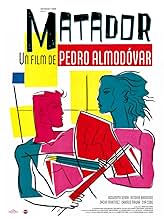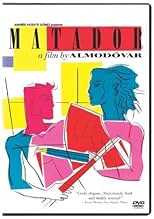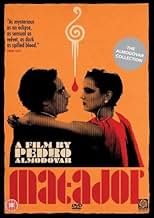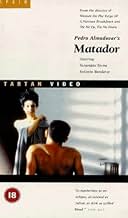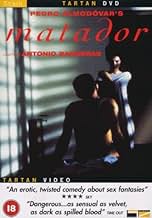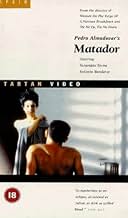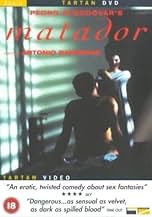Torero in ritiro e avvocatessa s'incontrano, si amano, si uccidono nell'attimo del piacere. Melodramma sulla corrida tutto sopra le righe dove gli esseri umani sostituiscono i tori, con un s... Leggi tuttoTorero in ritiro e avvocatessa s'incontrano, si amano, si uccidono nell'attimo del piacere. Melodramma sulla corrida tutto sopra le righe dove gli esseri umani sostituiscono i tori, con un sottofondo di ironia provocatoria. Amore e morte in una Spagna divisa tra rock e Opus Dei.Torero in ritiro e avvocatessa s'incontrano, si amano, si uccidono nell'attimo del piacere. Melodramma sulla corrida tutto sopra le righe dove gli esseri umani sostituiscono i tori, con un sottofondo di ironia provocatoria. Amore e morte in una Spagna divisa tra rock e Opus Dei.
- Regia
- Sceneggiatura
- Star
- Premi
- 6 vittorie e 6 candidature totali
- Diego
- (as Nacho Martinez)
- Vendedora Flores
- (as Bibi Andersen)
- Periodista
- (as Veronica Forque)
- Alumna 3ª
- (as Mercedes Jimenez)
- Alumna 4ª
- (as Francesca Romana)
Recensioni in evidenza
As the implications of the title would suggest, the film's narrative is bolstered by numerous references, both spoken and visual, to the obvious role-play and iconography of the bullfight. It is also a film about violence, and the sexuality of violence; an uncomfortable idea that is reinforced by the film's provocative opening sequence, in which we find the central matador of the title, Diego Montes, masturbating to violent scenes of exploitation cinema. The scene establishes the nature of the matador, both as a character and as a social phenomenon, as well as introducing the link between sex and death that will come to form an important thematic strand to the narrative. As the story progresses, the mechanisms of the drama conspire to throw together two separate characters that come to complement the unspoken desires and murderous lust that they seemingly share with one another, with the eventual courtship and inevitable seduction presented by the director as a surrogate bullfight in its self.
Where the film falls apart slightly is in the presentation of the character played by Antonio Banderas, a hyper-sensitive, implied homosexual who idolises the matador to the extent that he actually attempts to rape his young, fashion-model girlfriend (an act that eventually leads him to confess to a string of serial killings as a result of his mother's enforced, catholic guilt). It is a complex character, impeccably performed by the young Banderas, but his appearance ultimately sends the film off on a tangent that detracts from the central crux of the drama. Though the inclusion of this subplot does allow Almodóvar the chance to make a satirical comment on the nature of everything from fashion, to religion, sexuality, etc, these themes often feel like they've been handpicked from a completely different film, not always complimenting the central story, and too often leading it in directions that in the end feel unfinished or slightly unformed. Many of these loose ends can be glossed over, while some (the last minute implication of "second sight" as suggested by a solar eclipse) really seem to come out of leftfield.
Nevertheless, these are minor criticisms that don't necessarily destroy the ultimate intentions of the film - which really only become clear in the final scene - or the fantastic direction of Almodóvar and the performances of his cast. Although Matador certainly has its flaws (not to mention its detractors), it is, in my opinion, a fine little film and one of Almodóvar's most original and audacious creations. The performances are all incredibly committed, including the central pairing of Assumpta Serna and the late Nacho Martínez, as well the fine support from Banderas, the gorgeous Eva Cobo and Almodóvar regulars Carman Maura and Eusebio Poncela; whilst the central idea behind the script and the bold stokes of the director's intuitive grasp of the various film-making processes further refines and develops a number of themes that have come to be at the forefront of Almodóvar's career for the last twenty-five years.
It is completely nuts.
Pour in equal measures of sadism, masochism, bullfighting, perverted sexuality, and sexual violence. Add in a splash of comedy and soupcon of star-crossed lovers (if, for a moment, you thought pairing Tybalt and Lady McBeth qualified as star-crossed) and you have what passes as characterisation. Mix dark nights with gaudy flamenco colours and you have some striking cinematography. I'll come to the plot in a minute
Amoldovar was clearly enjoying Spanish cinema's new-found, post-Franco sexual and artistic liberalism. The prudish among his audience might suggest he was positively wallowing in it. Whatever the truth, Matador is a masterpiece of his style, if not, indeed, a whole style in of itself.
The plot or possibly a better description, the tapestry over which the characters move is a murder hunt. Very few prizes will be won, however, for guessing the culprit/s. Two people are quickly in the audience's frame because they are shown er murdering people on camera. A third person (Banderas, in to my mind his best Amoldovar role) confesses to the murders in a fit of insecurity and remorse over an attempted rape ("some girls get all the luck" comments a female duty officer dryly, proving that feminism wasn't that big in Spain back in the 1980s). Nevertheless, the net soon closes on the crushingly obvious culprits (who in the meantime have developed quite a crush on each other). As previously mentioned, completely nuts.
Matador's strengths are in its characterisation and its sheer bare-facedness. Amoldovar has, as usual, assembled a character list of freaks and proceeded to humanise all of them to the point where there is a genuine whiff of tragedy in the final act. To mention the great performances is really to rehearse the cast list. Assumpta Serna, Nacho Martinez, Antonio Banderas and Eva Cobo are all excellent. And it really is worth seeing, just for the young Antonio.
There are some interesting points made in the film about outsiders, liberalism, sexual politics and gender politics (as always with Amoldovar). I'll let you pick through them. It is, though, not so much a film as a giant red rag to the raging bull of conservatism, deftly whisked aside to the ragged applause of an admiring, if somewhat perplexed, audience. A positive Jimi Hendrix of a film, unpolished, with some definite dud notes, but undeniably the work of a genius. 8½/ 10
For once more, the notorious film-maker, at great shape, entertains with his trademark raving, hilarious, politically incorrect dialogs, pace and style and while dealing with dark (necrophilia) or serious (religious oppression) subject matters, it manages to be very funny and entertaining. What's great with Almodovar is that you simply CANNOT label his films. Is it comedy? nope. Is a thriller? nope. Is it a crime film? nope. This is Almodovar, so all pretenders go see another million dollar US product . But to all the admirers of unique and original films, this is definitely recommended, if you can tolerate with some weird humour, a bit sexy visuals and nudity and some violence. Matador is ART!
I had watched three films by him (Bad Education, Law Of Desire, Talk To Her), and all of them were rather twisted, but this one is defiantly the weirdest love fable I had ever seen or read even by his standards.
The story begins with a young man, (played by heavenly-gorgeous, 18 year old Antonio Banderas) who is studying to be a matador, under a world famous, but retired, due to an injury, Maestro. One night after being suspected of being a homosexual, he decides to prove his masculinity and toughness by attempting to rape Maestro's girlfriend. But being in reality a very innocent and tender soul, he literally faints before anything happens, when she accidentally cuts her finger.
The girls reports him, and while being questioned, the cops hang on him three more murders. Apparently there have been bodies popping up through out the city, with all the victims assaulted in the same strange manner - at the height of their sexual arousal, they are stabbed in the back of their necks, with a hair pin, with the same technique a toreador brings a bull down.
And now, brought together by serendipity, the female lawyer, who had come to defend Antonio, and is investigating the case, is beginning to have a sort of an "affair" with the Maestro. Both of them being obsessed with sex, violence and mostly important death, which they find the most arousing thing in the world. Imagine Romeo and Juliet, only where they both not only desire each other sexually, but also long for each other's death.
I had personally often wondered, why the element of violence is so often present in sex. Even when one makes love, no matter how gentle, there will be some hair pulling, slight choking or biting. To experience pain and dominance, seems to be counterintuitive to receiving pleasure, yet something in our wiring arouses us by that. With books like "Fifty Shades Of Grey' bondage and sadomasochism had become house hold names, and practices. But what I can't wrap my brain around is why do these seemingly, logically unpleasant activities arouse us?
The theme in this film, of the desire to kill the one you love, and to define death and brutal violence as sexy, that is bound to make an indelible imprint on your soul and to stay with you for the rest of your life.
Lo sapevi?
- QuizPedro Almodóvar: In the scene of the backstage dressing room, as "Francisco Montesinos".
- Citazioni
Francisco Montesinos: I've told you not to shoot up in the dressing rooms!
- ConnessioniFeatured in Playboy: The Story of X (1998)
I più visti
- How long is Matador?Powered by Alexa
Dettagli
- Data di uscita
- Paese di origine
- Siti ufficiali
- Lingua
- Celebre anche come
- 鬥牛士
- Luoghi delle riprese
- Viaducto de Segovia, Madrid, Spagna(Bridge where Maria and Diego talk.)
- Aziende produttrici
- Vedi altri crediti dell’azienda su IMDbPro
Botteghino
- Lordo Stati Uniti e Canada
- 279.394 USD
- Fine settimana di apertura Stati Uniti e Canada
- 13.399 USD
- 13 ago 2006
- Lordo in tutto il mondo
- 286.126 USD
Contribuisci a questa pagina


